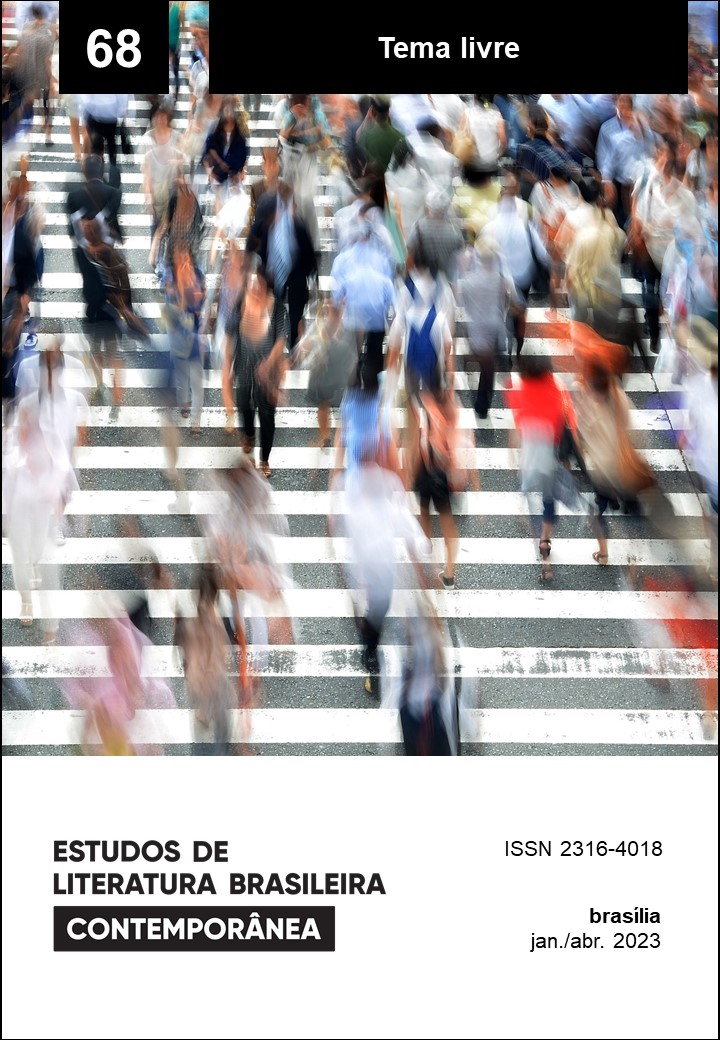Guilherme Zarvos and CEP 20.000: new politics of poetry in the city
DOI:
https://doi.org/10.1590/2316-40186806Keywords:
CEP 20.000; Guilherme Zarvos; politics.Abstract
In this article, the poetic production around the poetry collective CEP 20.000 — Centro de Experimentação Poética —, created in 1990 in Rio de Janeiro, and one of its creators, the poet Guilherme Zarvos, were analyzed, with a view to the idea that the artistic, literary, and cultural scene of the 1990s seem to accompany, in Brazil, a certain political and social transformation operated in the means of production, responding to this transformation in its own way. An update of the concept of “expanded field” for poetry is proposed, no longer thinking about the term from the expansion that it describes in the means of art production, but above all from its relationship with the modes of production.
Downloads
References
AMARAL, Luiz Eduardo Franco do (2014). A voz do boato: poesia falada, performance e experiência coletiva no RJ dos anos 90. Tese (Doutorado em Letras) – Pontifícia Universidade Católica do Rio de Janeiro, Rio de Janeiro.
DELEUZE, Gilles (1997). Crítica e clínica. Tradução de Peter Pál Pelbart. São Paulo: 34.
FOUCAULT, Michel (2013). De espaços outros. Estudos Avançados, São Paulo, v. 27, n. 79, p. 113-122. Disponível em: https://www.revistas.usp.br/eav/article/view/68705/71285. Acesso em: 3 mar. 2022. GARRAMUÑO, Florencia (2014). Frutos estranhos: sobre a inespecificidade na estética contemporânea. Tradução de Carlos Nougué. Rio de Janeiro: Rocco.
KRAUSS, Rosalind (2000). A voyage in the north sea: art in the age of the post-medium condition. Nova York: Thames and Hudson. Disponível em: https://artecontemporaneaeahc.files.wordpress.com/2016/10/ krauss_voyage-on-the-north-sea.pdf. Acesso em: 6 ago. 2021.
KRAUSS, Rosalind (2008). A escultura no campo ampliado. Arte & Ensaios, Rio de Janeiro, v. 17, n. 17, p. 128-137. Disponível em: https://revistas.ufrj.br/index.php/ae/article/view/52118/28402. Acesso em: 9 ago. 2021.
LADDAGA, Reinaldo (2012). Estética da emergência: a formação de outra cultura das artes. Tradução de Magda Lopes. São Paulo: Martins Fontes.
LUDMER, Josefina (2010). Literaturas pós-autônomas. Tradução de Flávia Cera. Sopro, Desterro, n. 20, p. 1-4. Disponível em: http://culturaebarbarie.org/sopro/n20.pdf. Acesso em: 9 ago. 2021.
LUDMER, Josefina (2011). Notas para literaturas pós-autônomas III. Tradução de Flávia Cera. Sopro, Desterro, n. 52, p. 2-3. Disponível em: http://culturaebarbarie.org/sopro/n52scribd.pdf. Acesso em: 9 ago. 2021.
PUCHEU, Alberto (2010). Apresentação. In: CICERO, Antonio (org.). Antonio Cicero / por Alberto Pucheu. Rio de Janeiro: EdUERJ. p. 9-72.
PUCHEU, Alberto (2014). A poesia contemporânea. Rio de Janeiro: Azougue. REZENDE, Renato (2010). Guilherme Zarvos: poesia e política. In: ZARVOS, Guilherme. Guilherme Zarvos / por Renato Rezende. Rio de Janeiro: EdUERJ.
REZENDE, Renato; SANTOS, Roberto Corrêa (2011). No contemporâneo: arte e escritura expandidas. Rio de Janeiro: Circuito.
ZARVOS, Guilherme (2009). Branco sobre branco: CEP 20.000/CEPensamento (1990-2008): uma possível rota. São Paulo: Ateliê; Rio de Janeiro: Nonoar.
Downloads
Published
How to Cite
Issue
Section
License
Copyright (c) 2023 Thiago Fernandes

This work is licensed under a Creative Commons Attribution-NoDerivatives 4.0 International License.
Authors who publish in this journal agree to the following terms:
a) The authors maintain the copyright and grant the journal the right of first publication, the work being simultaneously licensed under the Creative Commons Attribution License-Non Commercial 4.0 which allows the sharing of the work with acknowledgment of the authorship of the work and publication this journal.
b) Authors are authorized to enter into additional contracts separately, for non-exclusive distribution of the version of the work published in this journal (eg publish in institutional repository or as a book chapter), with authorship recognition and publication in this journal.
c) Authors are allowed and encouraged to publish and distribute their work online (eg in institutional repositories or on their personal page) after the editorial process, as this can generate productive changes, as well as increase the impact and citation of published work (See The Effect of Free Access).
d) The authors of the approved works authorize the magazine to, after publication, transfer its content for reproduction in content crawlers, virtual libraries and the like.
e) The authors assume that the texts submitted to the publication are of their original creation, being fully responsible for their content in the event of possible opposition by third parties.


